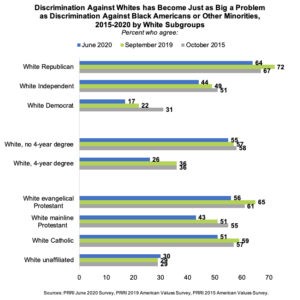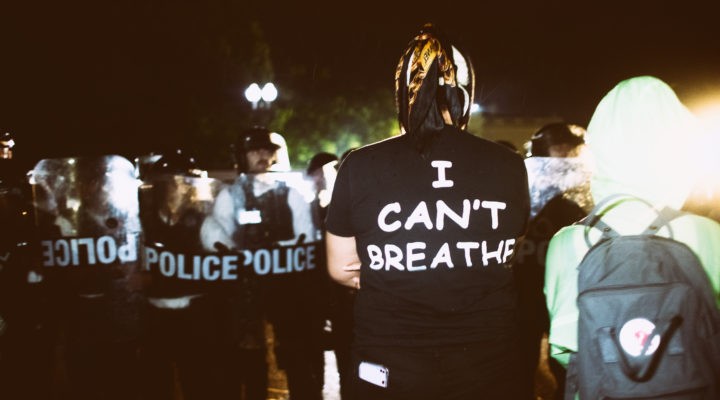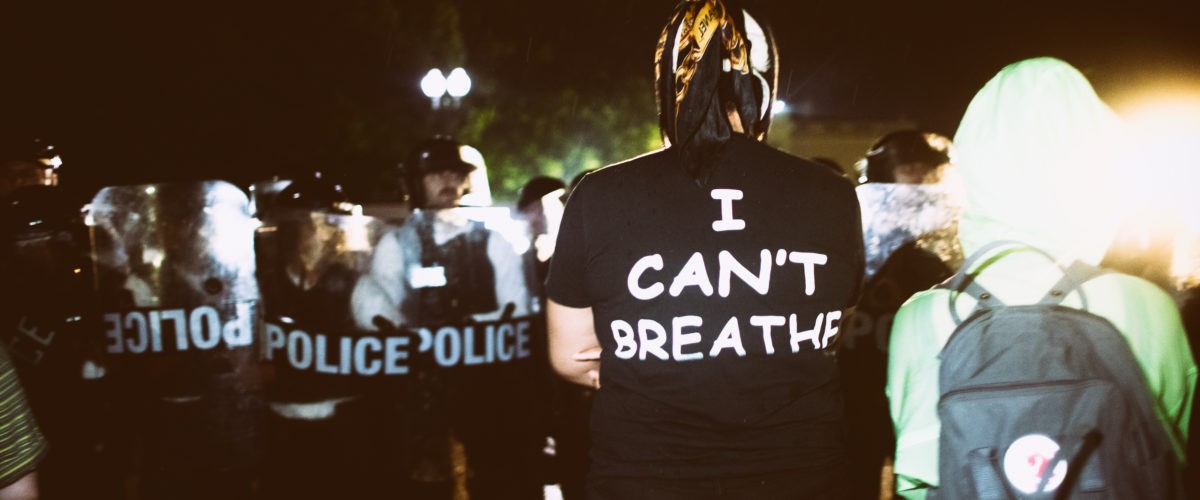Religious beliefs combined with racial identity continue to fuel dramatic differences in the way Americans view police killings of unarmed Black men, the prevalence of “reverse racism” and thinking of the Confederate flag and monuments to Confederate leaders as about “Southern heritage” rather than racism.
The latest findings come from new polling conducted in June by Public Religion Research Institute.
Police killings of unarmed Black men
While half of all Americans believe recent killings of unarmed Black men that have sparked months of protests are “isolated incidents,” only 17% of Black Americans see it that way. The views of Black Americans remain unchanged on this question over the past five years, while the proportion of white Americans who say police killings of Black men are isolated incidents has dropped 15 percentage points over the last five years, from 65% to 50%.
The largest change in attitudes on this question has occurred among white Democrats. Today, fewer than one in five (19%) white Democrats see police killings of unarmed Black men as isolated incidents — down by half from the 43% who said so in 2015.
In contrast, white Republicans are four times more likely than white Democrats to see these police killing as isolated incidents — a number only slightly changed over the past five years. Today, 81% of white Republicans affirm the isolated incident idea, down from 85% in 2015.
Seen through a religious identity lens, the greatest shift in attitudes is found among white mainline Protestants and white Catholics. Five years ago, they fell in line with white evangelical Protestants, with about three-fourths seeing police killings of unarmed Black men as isolated incidents. Recent high-profile cases of police killings and the subsequent protests have not changed the minds of white evangelical Protestants, who remain steady at 72% in not seeing a widespread problem or pattern to police killings. But recent events do appear to have changed the minds of white mainline Protestants and white Catholics, who have dropped from 73% and 71% respectively in affirming this view to 53% and 56% today.
By comparison, white Americans who are religiously unaffiliated are far less likely to see these police killing as isolated. Only 26% affirm that perspective.
Nonwhite Protestants also are far less likely than their white counterparts to see these as isolated killings, with only 31% affirming that view.
Views on “reverse” discrimination
Republicans (62%) are three times as likely as Democrats (19%) to believe discrimination against white Americans has become as a big a problem as discrimination against Black Americans and other minorities.
Among Republicans, this view has neither increased nor decreased in the past five years. However, perspectives among Democrats have shifted in the same period, dropping from 28% seeing discrimination against whites as equal to discrimination against Blacks to 19% today.
 Americans who view President Donald Trump favorably also are far more likely to see revere discrimination as an equal problem, with 69% of Trump supporters holding this view. That compares to 22% of Americans who support Joe Biden in the upcoming presidential contest.
Americans who view President Donald Trump favorably also are far more likely to see revere discrimination as an equal problem, with 69% of Trump supporters holding this view. That compares to 22% of Americans who support Joe Biden in the upcoming presidential contest.
Overall, only 38% of Americans believe reverse discrimination is a reality equal to the discrimination faced by Black Americans, while a 61% majority disagree with this view.
As with the other survey findings, religious affiliation joins race in having a strong correlation to views on this question. Although identifying as a Republican or a Trump supporter most strongly correlates to a perception of reverse discrimination, identifying as a white evangelical Protestant (56%) or white Catholic (51%) raises the likelihood of holding this view far above the national average.
The study found that white mainline Protestants are the only religious group in which agreement with this statement has declined consistently over the last five years, dropping from 55% in 2015 to 43% today.
Confederate flags and monuments
Is the Confederate flag a symbol of racism or a symbol of Southern pride? And are Confederate monuments statements of racism or Southern pride? Americans remain deeply divided on these questions, although more divided on the flag question than the monument question.
Among all Americans, 49% see the Confederate flag as a symbol of racism, while 48% see it as a symbol of Southern pride. By comparison, a clear majority (59%) of Americans see Confederate monuments as symbols of Southern pride, against 38% who see them as symbols of racism. These numbers have changed only slightly in the past five years.
Democrats and Republicans have become more polarized on the issue of the Confederate flag, with 82% of Republicans and 20% of Democrats seeing the flag as a symbol of Southern pride rather than racism. Republican views on this question have not changed in five years, but views among Democrats have changed, dropping from a 32% affirmation rate in 2015 to 20% today.
While the Confederate flag debate may be seen as primarily a Southern issue, the views of Americans across the country and beyond the South are starkly divided. Southerners are indeed most likely to say the Confederate flag is a symbol of Southern pride (54%), but that statement also is affirmed by 48% of Midwesterners, 45% of Westerners and 41% of Northeasterners.
Black Americans (16%) are far less likely than white Americans (57%) to see the Confederate flag as a symbol of Southern pride.
Three-fourths (76%) of white evangelical Protestants and 61% of white Catholics and 60% of white mainline Protestants say the Confederate flag is a symbol of Southern pride rather than of racism. However, the views of white evangelical Protestants have shown significant flux, with the Southern pride viewpoint increasing by 16 points between 2015 and 2019, then dropping 10 points between 2019 and 2020.
On the related issue of Confederate monuments, more Democrats have changed their minds toward seeing racism rather than Southern pride, while Republicans and independents have not shifted. Seen from a religious filter, little change was found from 2015 to 2020.
The PRRI survey was conducted among a random sample of adults age 18 and older living in the United States. The survey included a national sample representing all 50 states. Interviews were conducted online between June 26 and 29, 2020. The margin of error for the national survey is plus or minus 3.2 percentage points at the 95% level of confidence.


